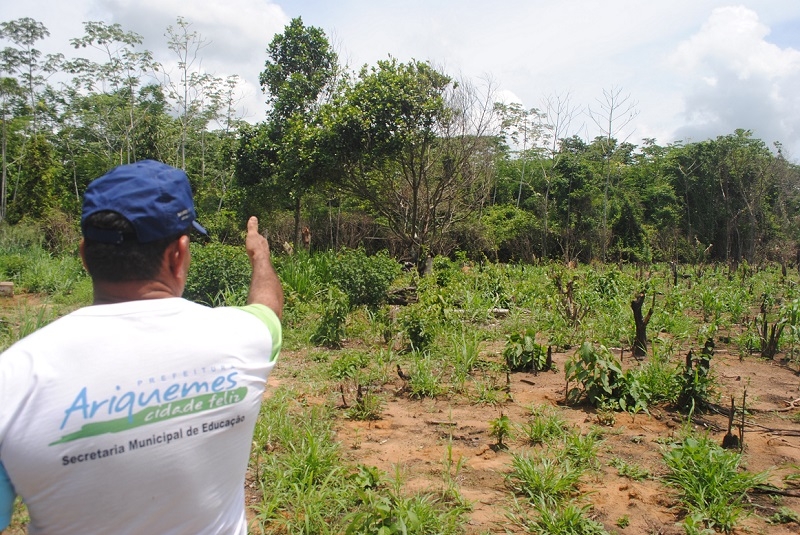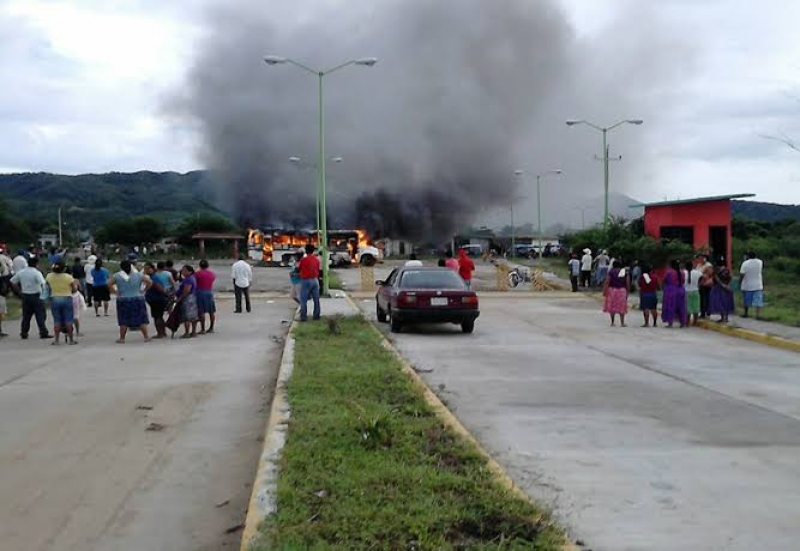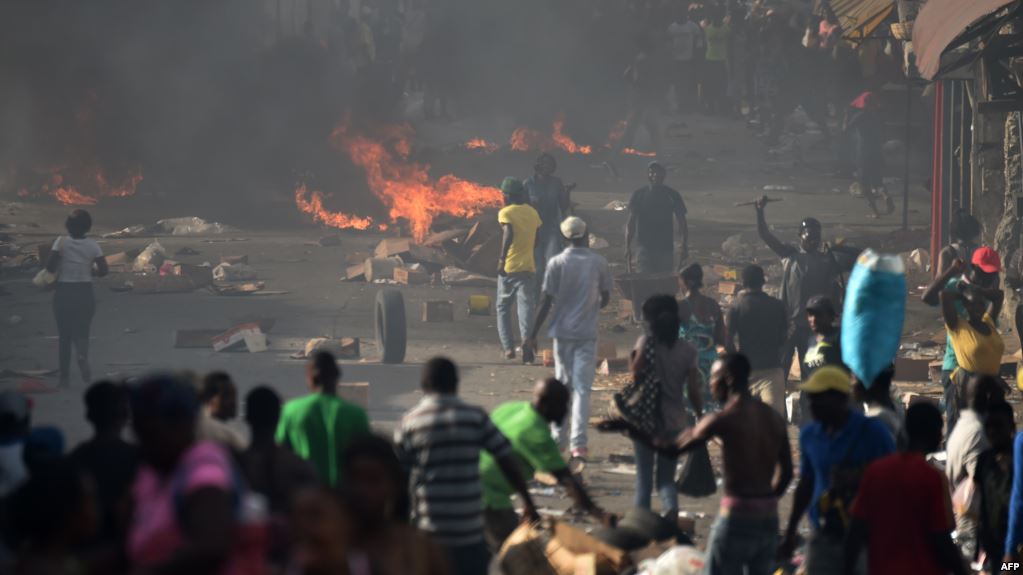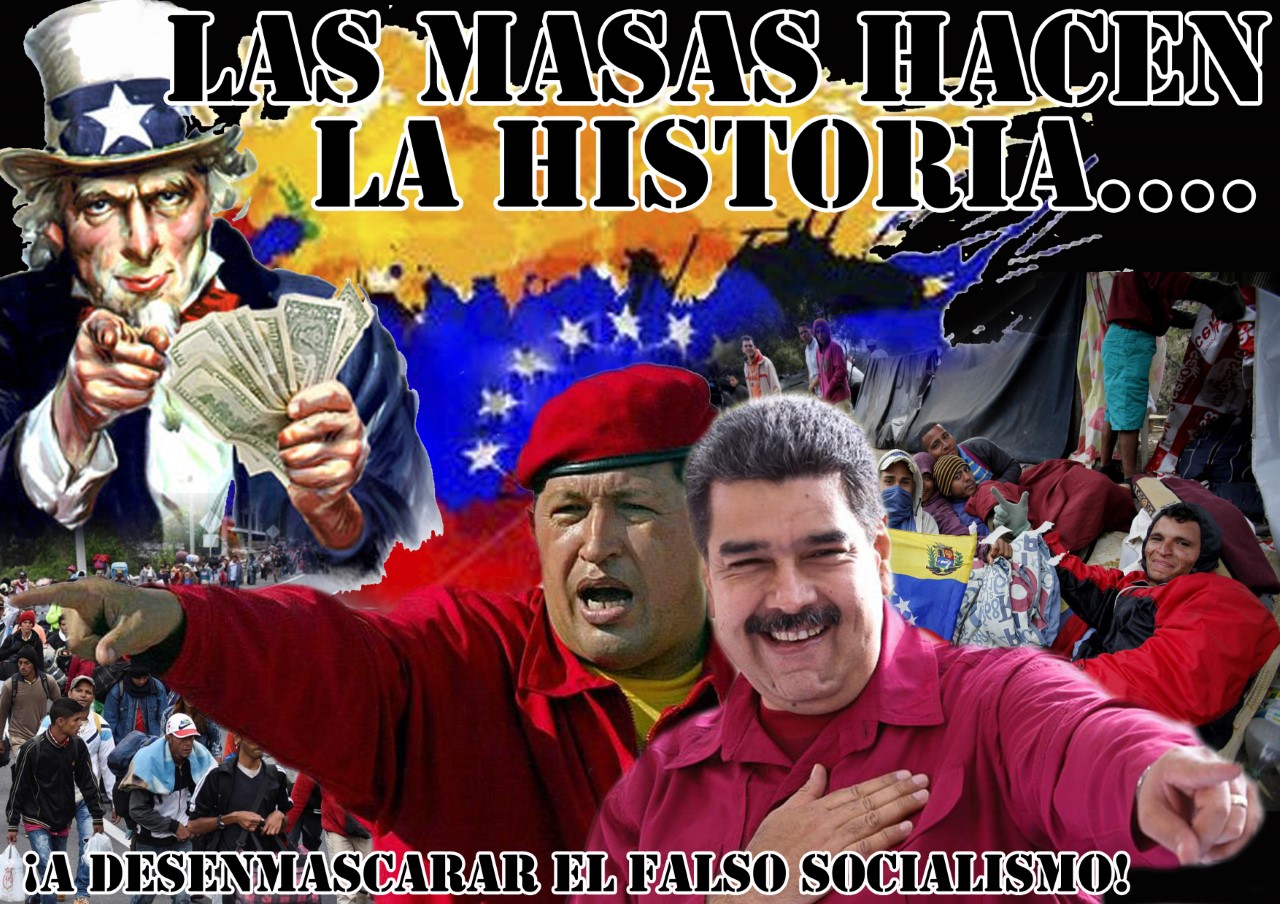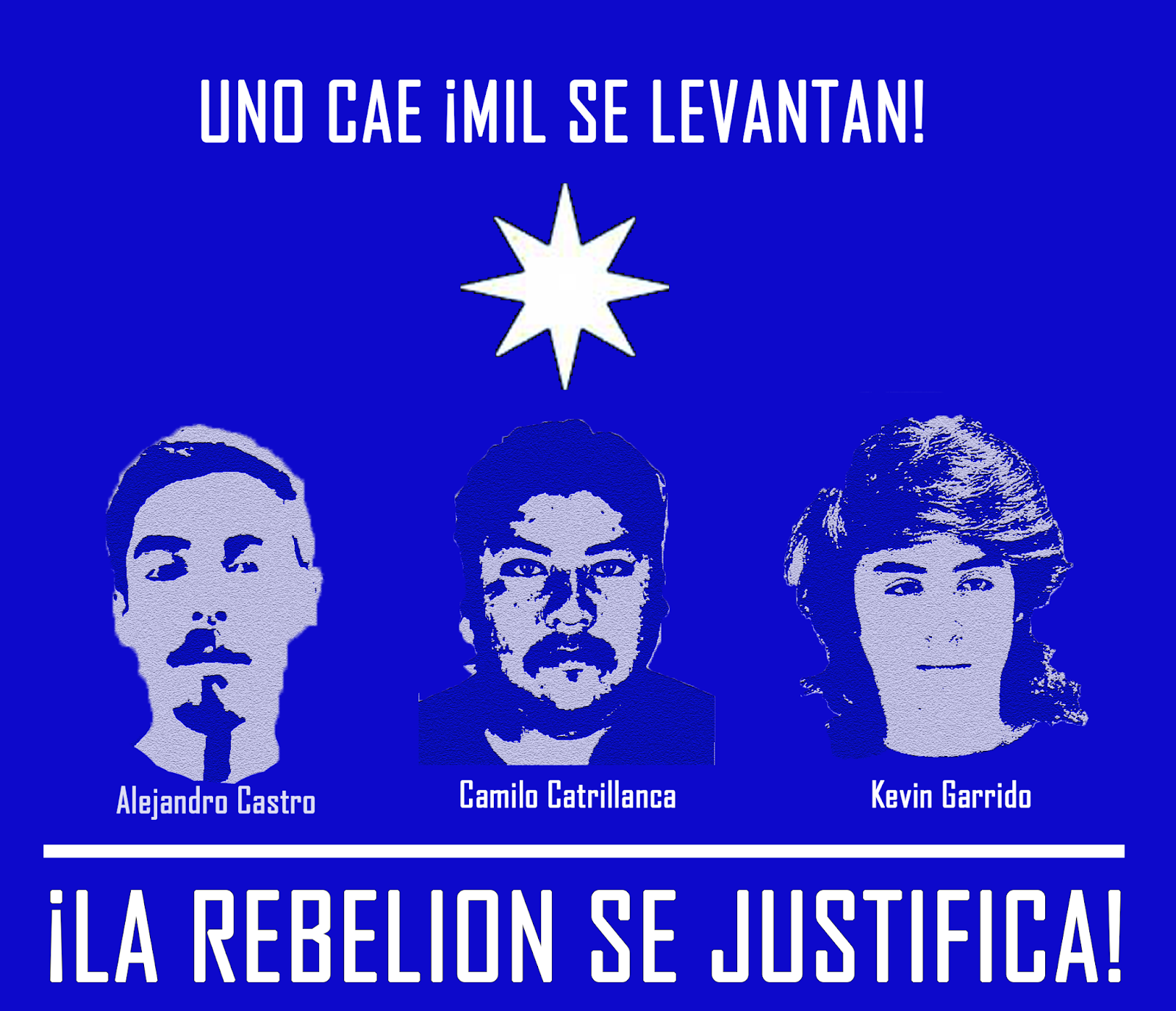Lateinamerika
Lateinamerika
- Details
- Category: Lateinamerika
- Details
- Category: Lateinamerika
Translated from an article of A Nova Democracia
Mexico: Active Election Boycott Prevents Polling in Town of Oaxaca
In the town of San Dionisio del Mar, in the region of Istmo de Tehuantepec (state of Oaxaca), there was an active boycott against the new municipal presidency election (equivalent to mayor) and prevented it from being held on 9 December. The boycott, approved at the People´s General Assembly, was made counting with fire and violent protests.
- Details
- Category: Lateinamerika
Third Meeting of Maoist Parties in Europe: Unification around Maoism advances
The Third Meeting of Marxist-Leninist-Maoist Parties and Organizations of Europe was held in November 2018. The Red Flag Committee (Germany), Maoist Communist Party of France (PCmF), Tjen Folket - Communist League (Norway), Red Flag Collective (Finland), Communist Party of Turkey / Marxist-Leninist and Peru People´s Movement (Reorganization Committee) were present.
From the Meeting, three joint resolutions were released: the first, Resolution on the Third Meeting of Marxist-Leninist-Maoist Parties and Organizations in Europe, the second Resolution of Class Solidarity with the People's Wars throughout the world, and the third Resolution for to defend the revolutionary political prisoners and prisoners of war and those disappeared by the reaction, published in the site Dem Volke Dienen. The documents in Portuguese can be read in the blog Serve the People.
The Resolutions affirm in a firm and enthusiastic way the commitment of Parties and Organizations to the ideological unity around Maoism and to fight for the Unified Maoist International Conference at the service of the Proletarian World Revolution. And they credit the advance in Europe to the initiative of the Latin American Maoist Parties and Organizations, which held its Fifth Meeting in 2016 - a milestone for the reunification of the world's communists, according to declarations signed by these parties.
"The successful conclusion of the III. Meeting marks another hallmark in the ongoing process of uniting in theoretical debate and joint action. On the basis of Marxism-Leninism-Maoism, principally Maoism, and in our ongoing struggle for ideological unity today, always implacably linked with the struggle against revisionism, we will increase our efforts in serving the Proletarian World Revolution." is the synthesis of the progress of the Meeting.
They also take their stand and send their greetings to political prisoners around the world qualifying them as inspiration. "Them holding high the position of our class, their the determination to not succumb to rotten betrayals and their unconciliable stance in the struggles that brought them into the sights of the enemy are a true inspiration for the revolutionaries of the world. "
Likewise, Parties and Organizations take a stand and greet the People´s Wars being led by Communist Parties throughout the world. "In the People’s Wars in Peru, India, Turkey and the Philippines, daring to fight and paying the toll with their precious blood, comrades stand in the thick of the struggle to sweep imperialism from the face of the earth. Their unwavering determination to achieve, with the principle and most developed form of class struggle which is People’s War, the new democratic revolution, to progress without interruption to the socialist revolution so to then march towards communism by means of cultural revolutions is a shining beacon for the international proletariat and the peoples of the world."
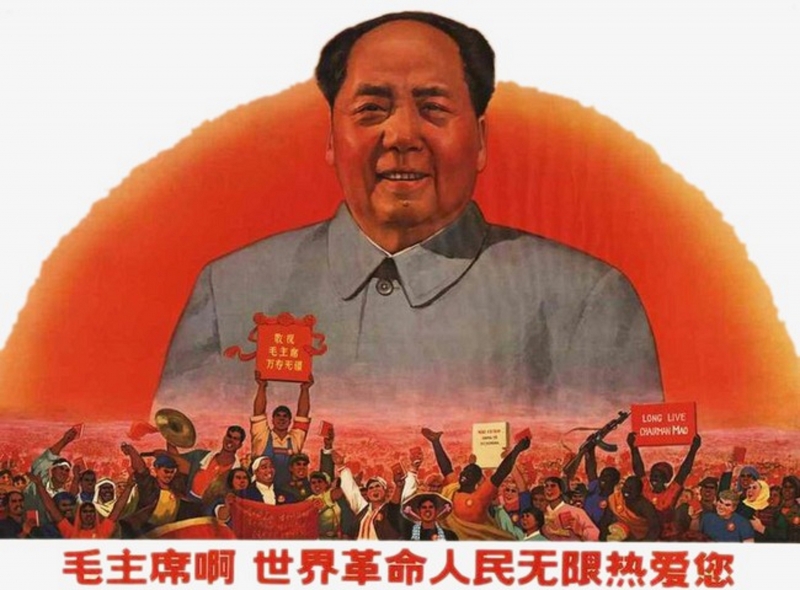
Translated from A Nova Democracia
- Details
- Category: Lateinamerika
On the 30th of November, the commemorative festivity for our dear comrade José Sales Pimenta took place in Brazil with a huge mass turnout. CEBRASPO on this occasion published a video, that also depicts our comrade in his youth, agitating and engaging the police. Furthermore, we share the statement issued by the Indian intellectual Amit Bhattacharyya for this very occasion, who also contributed with several talks to the 5th Conference on bureaucratic capitalism that took place 2016 in Rio.
- Details
- Category: Lateinamerika
On November 28 there was a new mobilization of students in several cities of the country. The demand remains the same: more funding for public Higher Education Institutions (HEIs). The State's response also remains the same: to defend its education project as a business of the big capital and imperialism, which can be summarized as follows: 1- Gradual de-financing of HEIs; 2- Compelling them to self-finance by raising enrollments, selling research to multinationals and large companies, selling cultural and sports services to the middle class, and ending the support programs for the popular classes within the University; 3- Promote educational credits, strengthening the Icetex with state resources and with loans from the World Bank, promoting that students and their families get indebted with educational loans to access higher education; 4- Increase the level of demand for admission to public universities, with expensive registration pins and more difficult admission tests, which leaves the poorest young people who come from public schools with almost no possibilities.
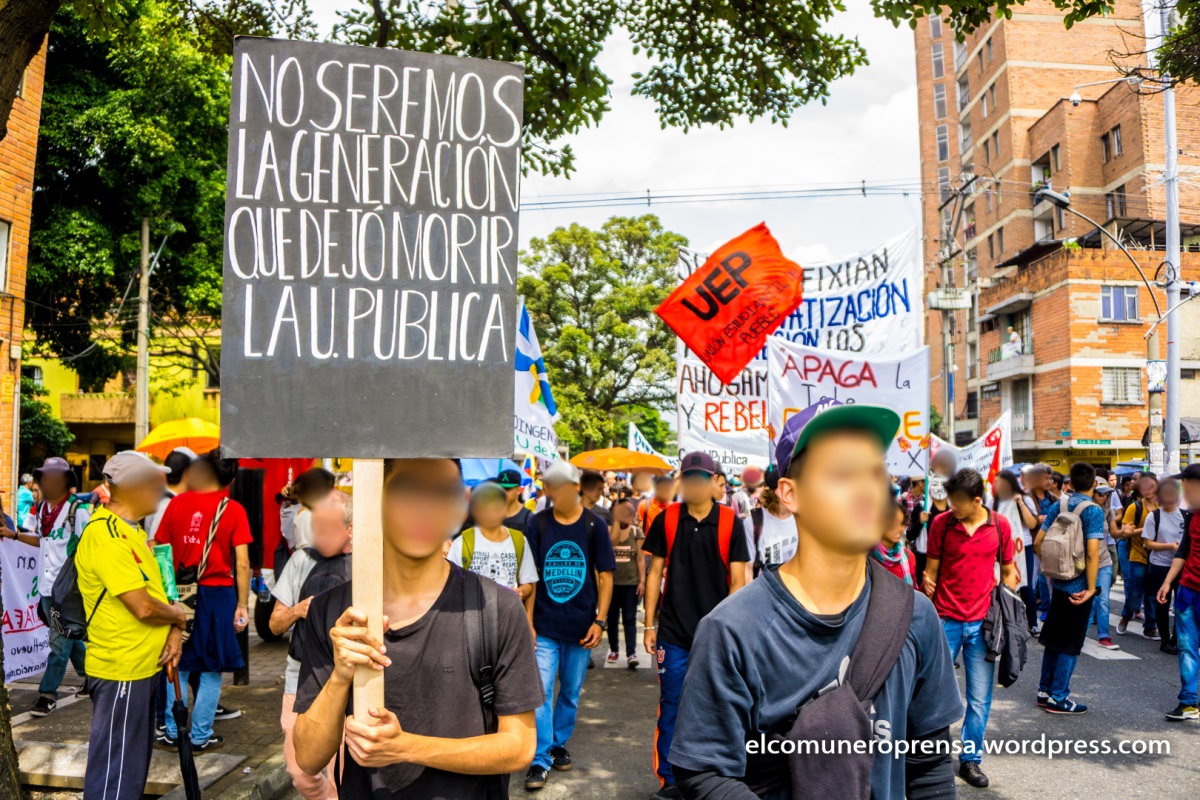
This state plan, applied little by little since the 90s, has led public universities to an unprecedented crisis: some have been applied bankruptcy law, others with buildings that are falling apart, dismantle the university welfare for popular sectors (residences, restaurants and free transportation), collection of registration pins with values between $ 50,000 and $ 120,000, hiring professors per hour chair, minimum enrollment above $ 500,000 / semester in large amount of public HEI, collection of outputs field to students, among many other expressions that affect all students, but especially the poorest, because every year there are fewer guarantees for young people from working and peasant families can access and maintain public university. And while the poorest young people are gradually excluded from public universities, the middle class (strata 3, 4 and 5) are now the sector to which the public university is directed, since they are the children of families with the ability to pay tuition fees, currently between $ 1,000,000 and $ 3,000,000 per semester, and continue to rise.
Faced with this situation, the last governments (Santos and now Duque), continue to deepen the plan: not giving importance for public universities and greater budget for Icetex (educational credits), but now they created a new ingredient: 5- Strengthening of most prestigious private universities` programs, through programs such as the former "Ser Pilo Paga" or the new "Generation E", which are scholarships for the best secondary school students, programs that annually only favor less than 2% of all high school graduates 1 , 2 and 3, and that are resources that in more than 80% end up in private ones. A great business in which private universities, banks and Icetex (which pays very high interest to the World Bank) win, and loses the working people, the children of workers, peasants and the middle classes, for whom, with the gradual dismantling of the public university, there is only one option: borrow to study.
This year, facing the alarm of several rectors of public universities, that the resources not even did reach enough to finish the year, unleashed an ample student and teacher movement that already completes more than a month, and in some cities more than two months, with weekly mobilizations and gradual increase in combativity and confrontations with the police. The past November 28 was not the exception, after the march, students of several universities decided to make a blockade of Barranquilla Street, outside the University of Antioquia (UdeA), to exert greater pressure on the State. Before the repression of the riot police, the students responded with stones, sticks, explosives and Molotov cocktails. Below are photographs of the march in the city of Medellín and the confrontation with the police in UdeA.
Translated from El Comunero
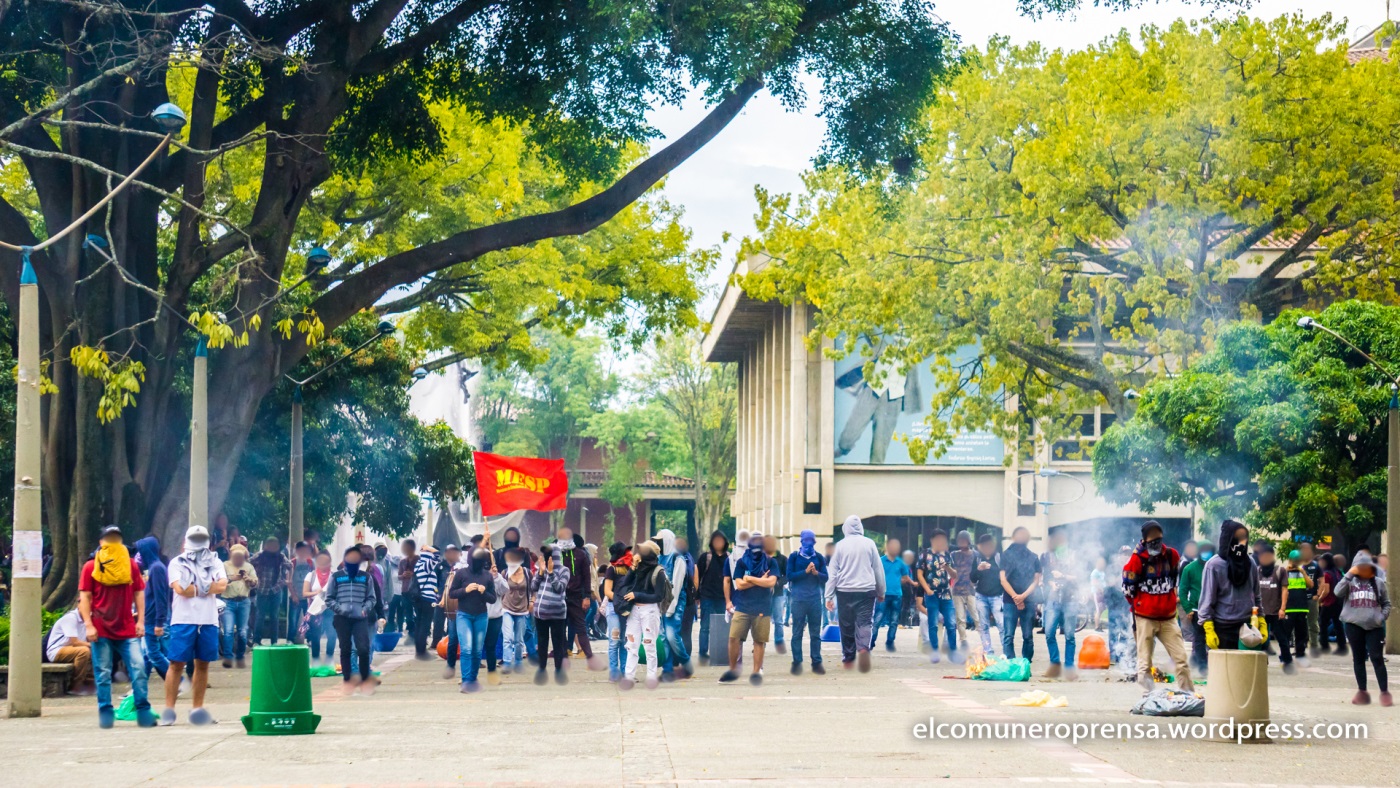
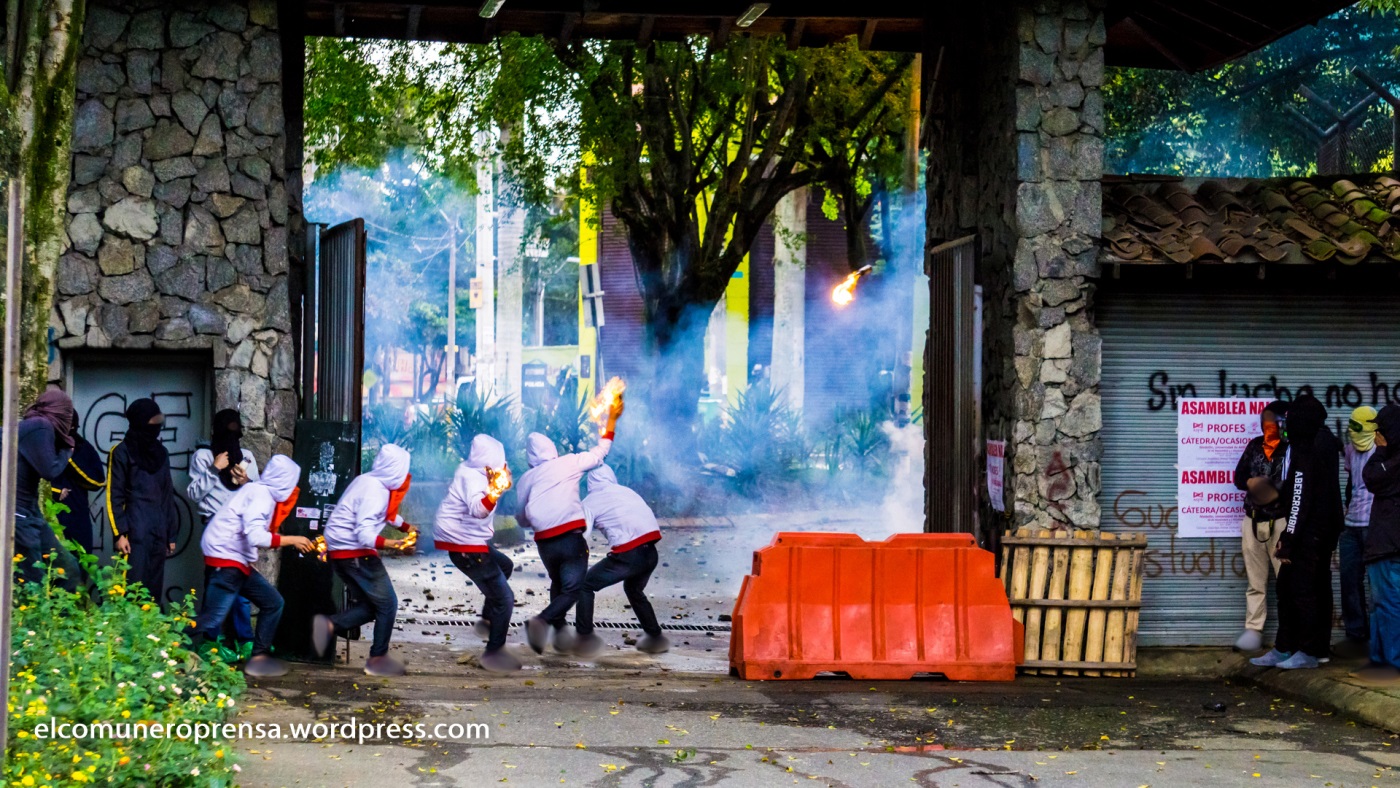
- Details
- Category: Lateinamerika
On November 24, Thousands of workers and youths violently protested in the capital of the country, Port-au-Prince, demanding punishment for the corrupt and against the situation of the country. They also demanded the resignation of the current semi-colonial president, Jovenel Moise. This was the sixth consecutive day of protests.
- Details
- Category: Lateinamerika
Ecuador closed the 20th century with an unprecedented economic crisis that lasted until a few years ago, and that in part was avoided by state reforms undertaken by Correa’s bureaucratic regime.
In the period between 1982 and 1999, the GDP fell 7.3% when measure in sucres, and 30.1% when measured in dollars; it went from 19.7 billion to 13.7 billions of dollars. The GDP per capita was reduced by 32%; it collapsed from 1,619 to 1,109 dollars.
The country experienced one of the fastest impoverishing rates in the history of Latin America: between 1995 and 2000, the number of poor people increased from 3.9 to 9.1 million; in percentages, from 34% to 71%; the extreme poverty rate doubled, from 2.1 to 4.5 million, the relative leap was from 12% to 31%. Under these conditions, there was an accelerated deterioration of the living standards. The average income per person reached 43% of the Latin American average.
This was accompanied by a higher concentration of wealth. So, while in 1990 the poorest 20% of people received 4.6% if the total incomes, in 2000 they received only 2.5%; during the same period, the richest 20% of the population increased the amount of money they received from 52% of total incomes to more than 61%.
This bankruptcy was shown and revealed to the world in the form of abrupt emigration of countrymen to the US and Europe.
Nearly 3 million Ecuadorians emigrated to the US and Europe, dimembering homes and abandoning their small and medium-sized properties, which generated an arbrupt process of depopulation of the countryside. Many of these properties were acquired at the price of a "stolen hen" by speculators. This made the greater concentration of land by speculators and big landlords possible.
3 million Ecuadorians who, incredible as it may seem, contributed more than 3 billion a year in remittances for more than 16 years, until the second half of Correa’s regime (2016); the second most important income of foreign currency to the State, second only to oil exports.
That is, the old state not only forcefully sent compatriots to exile, but also parasitized and lived on their remittances for years to satisfy their requirements that ultimately ended up favoring the bureaucratic bourgeoisie who had the ability to continue to produce economically and politically from the state apparatus. In any case, it also benefited the comprator bourgeoisie (the bankers) who were in charge of "legalizing" dollars and euros generated by the emigrants by opening bank branches in Spain and other European countries.
Today, nearly one million Venezuelans have entered Ecuador. Of those, 250,000 have remained to nurture the ranks of unemployment, underemployment, and employment, making the levels of employability in Ecuador more critical.
So, when we see the origins of the emigration of Venezuelans to the rest of the world, we are thinking that the numbers previously exposed about the crisis of bureaucratic capitalism in Ecuador, are the figures that now afflict the masses in Venezuela, and that, in one way or another, they are the samples of bankruptcy that are experienced and caused by bureaucratic capitalism in that country and in others that are characterized in the same way: semi-feudal and semicolonial.
In Venezuela, with a hyperinflation of more than 700%, the economy shrank by 30% from 2013 to 2018; their currency’s buying power was reduced to nothing; 5% of the population has emigrated. 25% of Venezuelan children suffer from chronic malnutrition; prices shot up over 2000%; there was an 11% drop in GDP. The price of a basic basket rose 400%.
Of course, it would be a grave error to say that this crisis was solely caused by Maduro’s mismanagement of the government; it is part of bureaucratic capitalism’s cycle because, whether with Maduro or the comprator right wing in the government, this situation would have happened anyway. Why? Because their economy, which is similar to ours - semi-feudal and semicolonial - is dependent on extractivism and monoproduction; it is incapable of developing a labor force because imperialism does not allow it because it is very comfortable for the bourgeoisie in Venezuela to extract more income from imports and from the mobility of financing capital. But that’s not all. The regime of production relations is semi-feudal and does not allow itself to be “conditioned” to Russian and Chinese capital influence, which, in conflict with Yankee imperialism, destabilizes the anemic productive structure; because it depends on monoproduction (hydrocarbons), the fall of the price of petroleum caused the state budget to collapse and the deficit to become unmanageable. And after all of this, you have to add the criminal imperialist embargo that meant to punish chavismo for getting closer to other imperialist powers.
The inter-bourgeois contradiction is also responsible for adding its own damages. The economic/commercial speculation, sabotage and monopolization that the comprador bourgeoisie exercised also influenced the crisis to become more dramatic for the masses.
Regarding the Venezuelans’ immigration to Ecuador, we have to add the presence of hundreds of thousands of citizens from Colombia, Peru, and Haiti who live in Ecuador as well, where they gain more when sending their earned dollars back home. That is to say, we not only have to withstand the weight of the bureaucratic capitalism crisis in Ecuador, but, in one way or another, the masses have to carry the weight of the bureaucratic capitalism crisis of Venezuela, Colombia, Peru, and Haiti.
We, the Ecuadorian community, know the complexity in emigrating in order to half-way improve the lives of our family while carrying the burden of the bureaucratic capitalism crisis. In this way, we show solidarity with the Venezuelan community who are victims of criminal embargo and Yankee imperialism aggression that spares no means nor measures to neutralize Maduro’s regime. It is evident that the US will not tolerate in the slightest any political manifestation that is not compatible with with its interests; but we also fight the reformist Maduro regime that has been incapable of responding to the expectations of the great majorities to yield to the strengthening of the bureaucratic bourgeoisie that has found its main exponent in the Armed Forces. Hence its relative stability.
The proletariat and Ecuador stand in solidarity with the poor masses in Venezuela, with the struggles, with their firm anti-imperialist position; but note that we will make sure that these thousands of Venezuelans who are now amongst us do not climb the ranks of the reactionary forces of our country, on the contrary, we will make sure that they stand on the side of the people, of the class.
The difficult experiences that the poor masses in Venezuela have had to endure have caused them to stigmatize revolution and socialism characterized by the revolutions that followers of socialism of the XXI century have carried out; the citizen revolution and the Bolivian revolution bring about a discourse of demotivation that is counter revolutionary and favors imperialist and dominante class aspirations.
The government itself is very ambiguous: while on one hand they condemn the Maduro regime for the emigration of citizens, on the other hand they hide the role that the US has played in this meager process while also standing in solidarity with the immigrants, but demanding their passport when they enter; later they raise the conditions required to enter and those faithful to Moreno’s foolishness implement a measure of “solidarity” and “welcome,” but we give them the opportunity to take a free bus that will drop them off at Peru’s border so that they can continue their journey.
This murderous regime continues to show so much stupidity and misery. Fatuous in its own unique way.
The Venezuelan problem must be resolved by the Venezuelans with correct class direction, not only against Yankee imperialism, but also against bureaucratic capitalism and the dictatorship of big landlords and big bourgeoisie that have been recreated by Maduro’s corporate and bureaucratic regime.
Venezuelans must resolve their problems, but being part of the international proletariat, it is the responsibility of the international proletariat to give the Venezuelans all their ideological and political support so that the Venezuelans can follow it with correct class leadership. The international proletariat also has the responsibility to help combat the ruling classes and imperialism in order to lay down the path towards the Revolution of a New Democracy uninterruptedly transiting into socialism.
However, given the conditions in which imperialism would dare invade Venezuela, the international proletariat and oppressed communities around the world are responsible for combining forces in order fight Yankee imperialism on every level, but not as an act intended to defend chavismo and Maduro, but as an act of support, class solidarity, and struggle in favor of the majority in Venezuela who will carry the responsibility of launching a direct and violent fight for national liberation against imperialism and its creole figureheads.
THE BOURGEOISIE AND HUGE LANDLORDS WILL CARRY THE BURDEN OF CAPITALISM’S BUREAUCRATIC CRISIS!
UNMASK THE TRUE CHARACTER OF MADURO’S BOURGEOIS, CORPORATIST, AND REFORMIST REGIME!
THE MIGRATION OF VENEZUELANS IS A PRODUCT OF CAPITALISM’S BUREAUCRATIC CRISIS IN VENEZUELA AND THE CRIMINAL IMPERIALIST EMBARGO!
THE SOLUTION FOR THE MASSES IN VENEZUELA DOES NOT LIE IN MIGRATING, BUT IN STRUGGLING!
We recieved this translation from the article from Frente de defesa de luchas del pueblo.
- Details
- Category: Lateinamerika
On November 14, the weichafe [AT: Mapuche term for warrior] Camilo Catrillanca, 24 years old, was murdered from behind by hands of the Jungla Command. Immediately after, students, residents and workers took to the streets to unleash the contained anger with actions throughout the country.
On the following day, November 15, the Day of National Protest for No More Zones of Sacrifice, that was called by the Open Cabildo [AT: indigenous representative institution] of Quintero-Puchuncaví - in whose territory has been a struggle against the extreme pollution generated by the imperialist and monopolistic companies raging for months - was a true day of popular protest. The streets of Santiago, Concepción and Temuco were a real battlefield for more than 3 hours, where the masses surpassed even the capacities of the police itself, by installing barricades in different points and sabotaging banks, service centers, pharmacies, etc.
